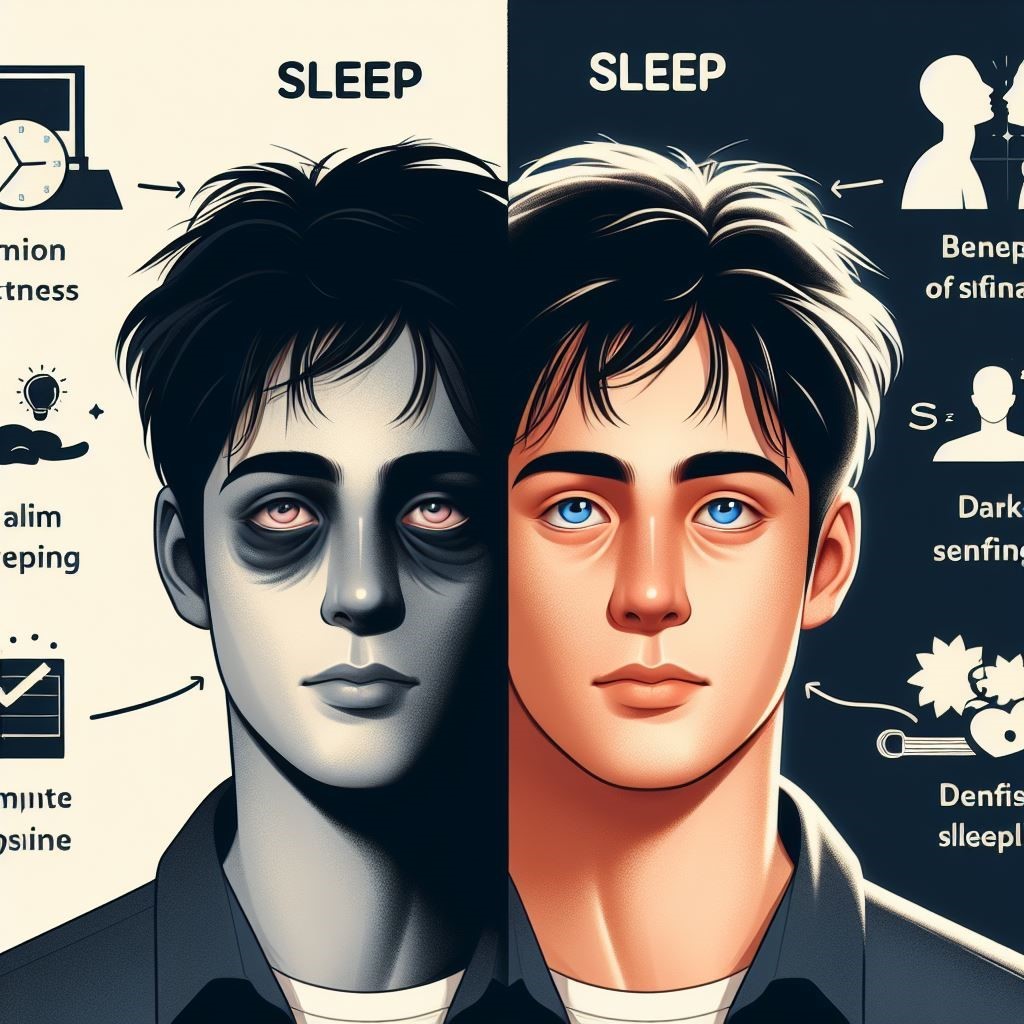Sleep Science – The First Key to a Healthy Life
Unlock the secrets of a healthy life with Sleep Science. Explore how quality sleep impacts health and well-being. Your first key to a healthier, happier life.
Introduction
Getting enough quality sleep is one of the most important things you can do for your overall health and wellbeing. Sleep allows your body and mind to recharge and recover, improving cognitive function, mood, and physical health. Sleep science provides fascinating insights into why we need sleep, what happens during sleep, and how to optimize your sleep habits for better rest.
Key Takeaways from Sleep Science

Key Takeaways from Sleep Science
- Adults need 7-9 hours of sleep daily for optimal health and daytime performance.
- Sleep helps consolidate memories, learning, and new skills acquired during the day.
- Sleep regulates appetite, metabolism, and weight control by impacting hormones like ghrelin and leptin.
- During sleep, the brain clears out neurotoxic waste proteins like beta-amyloid linked to brain disorders.
- Getting enough deep, restorative sleep supports immune function and reduces the risk of illness.
- Sleep deprivation impairs cognitive function, focus, memory, mood, and motor skills.
- Lack of sleep is associated with numerous adverse health effects, such as obesity, heart disease, diabetes, and depression.
- Optimizing sleep hygiene through habits like maintaining a regular bedtime routine, limiting blue light exposure at night, and creating a cool, dark, muted sleeping environment supports better sleep.
Now, let’s dive deeper into sleep science and all the ways it demonstrates why quality sleep is the first key to sustained health and well-being.
Part 1: Why We Need Sleep and Its Impact on Health

Sleep Science reveals the crucial functions of sleep for physical health, brain function, and emotional well-being. Understand the science behind quality rest to prioritize a healthy life.
Functions of Sleep
During sleep, the body, and brain undergo critical vital processes that maintain optimal functioning. Some of the critical functions of sleep supported by sleep science research include:
Cell Repair
- Growth hormones are secreted to stimulate tissue growth and muscle repair. Deep, high-quality sleep is when the most growth hormone is produced.
Brain Detoxification
- The brain’s glymphatic system clears out neurotoxic proteins and metabolic waste accumulating during wakefulness. This “brain cleanse” may prevent neurodegenerative disease.
Memory Consolidation
- Memories are transferred from short-term to long-term storage through synaptic plasticity, allowing you to retain new information and skills learned while awake.
Cognitive Function
- Concentration, focus, reasoning, problem-solving, and creative thinking are sharpened by sufficient sleep.
Emotional Regulation
- Sleep helps process emotions and stressors from the day productively, so you wake up refreshed. Lack of sleep is linked to emotional reactivity, anxiety, and depression.
Immune Support
- Sleep activates immune cells and infection-fighting antibodies and cytokines while suppressing inflammatory signals. Short sleep duration impairs immune defences.
Metabolic and Appetite Regulation
- Sleep affects hormones like leptin and ghrelin that control hunger cues and blood sugar control. Poor sleep is associated with insulin resistance.
As this overview demonstrates, sleep is indispensable in promoting nearly every aspect of optimal health. Prioritizing sufficient, high-quality sleep should be a top health goal.
Sleep Requirements Across Ages
Sleep requirements vary across different life stages due to developmental changes. Sleep science research has helped establish general sleep time recommendations for each age group:
- Newborns – 14 to 17 hours per day
- Infants – 12 to 15 hours
- Toddlers – 11 to 14 hours
- Preschoolers – 10 to 13 hours
- School-age – 9 to 12 hours
- Teens – 8 to 10 hours
- Adults – 7 to 9 hours
- Older Adults – 7 to 8 hours
Of course, individual needs differ. However, these age-based recommendations, supported by Sleep Science, represent the average sleep time required to support optimal health and daytime performance. Getting sufficient, high-quality sleep is especially critical during early growth and development. #SleepScience
Health Effects of Sleep Deprivation
Insufficient sleep has been extensively linked to adverse effects throughout the body and brain. Some of the detrimental impacts tied to poor sleep by sleep science studies include:
- Obesity – Sleep deprivation disrupts hormones regulating hunger, satiety, and metabolism. Lack of sleep makes weight loss more difficult.
- Diabetes – Poor sleep quality and duration are associated with insulin resistance, elevated blood sugar levels, and increased diabetes risk.
- Heart disease – Sleep loss activates the sympathetic nervous system, raises blood pressure, and inflames blood vessels, increasing the risk of cardiovascular disease.
- Depression – Disrupted sleep patterns and insomnia promote the development of depressive symptoms and clinical depression.
- Impaired immunity – short sleep duration suppresses immune cells and infection-fighting antibodies, raising susceptibility to viruses and other illnesses.
- Decreased cognitive function – Inadequate sleep impairs attention, focus, memory, problem-solving, reasoning, and overall performance.
- Premature aging – Chronic sleep loss accelerates cellular aging through oxidative stress, inflammation, and disrupted metabolic processes.
Investing in consistent, high-quality sleep is a preventative health measure against all these undesirable effects while supporting bodily restoration and rejuvenation.
Part 2: Optimizing Sleep Habits and Hygiene

In part one, we examined why sleep is vital to health and how sleep deprivation adversely affects the brain and body. Given the risks of insufficient sleep, optimizing sleep habits and hygiene is paramount. Let’s discuss sleep science-backed recommendations for achieving more consistent, restorative rest.
Set a Consistent Sleep Schedule
Your body’s circadian rhythm regulates the sleep-wake cycle and performs best with regularity. Going to bed and waking up concurrently train your body to expect sleep at a particular time. This strengthens the sleep drive when that time approaches, making falling and staying asleep easier. Aim for no more than a 30-60 minute variation on weeknights and weekends.
Optimize Your Sleep Environment
The physical bedroom environment significantly impacts sleep quality. Based on sleep science research, the ideal sleep setting includes:
- Cool temperature between 60-67°F
- Profound darkness with blackout curtains
- Minimal ambient noise below 40 decibels
- Comfortable, high-quality mattresses and pillows
- Breathable, moisture-wicking bedding material like cotton
These modifications minimize sleep disruptions from temperature, light, and noise.
Avoid Stimulants Before Bedtime
Consuming stimulating substances close to bedtime disrupts the natural relaxation of the nervous system required for sleep.
- Cut off caffeine intake by early afternoon.
- Avoid large meals within 2 hours of bed.
- Limit alcohol before bed, as it fragments sleep patterns.
- Never smoke before bed, as nicotine is very stimulating.
Relax and Unwind Before Bed
Transition smoothly into sleep by incorporating relaxing rituals to do before bedtime each night:
- Take a warm bath or shower.
- Read fiction, not non-fiction.
- Do light stretches or meditate.
- Dim the lights 1-2 hours before bedtime.
Relaxation techniques ease your mind into a state conducive to restful sleep.
Be Consistent with a Bedtime Routine
Performing the same relaxing activities before bed each night prepares your body for sleep. This acts as a cue that it’s time to unwind and fall asleep. Example bedtime routine activities include:
- Brushing teeth
- Getting into pajamas
- Reading or listening to calm music.
- Setting out clothes for the morning
- Meditation and gratitude journaling
Choose a sequence that you find calming and practice it nightly.
Optimize Your Sleeping Position
Sleeping in a position that properly aligns the neck and spine minimizes pain and reduces disruptions. Guidelines based on sleep science research include:
- Side sleeping with knees bent or pillow between legs.
- Back sleeping with lumbar support underneath knees
- Stomach sleeping with a thin pillow under hips/lower abdomen.
Choose what feels most comfortable for your body.
Committing to these sleep hygiene practices and habits can help you achieve more consistent, profoundly restorative sleep to power your days. Quality sleep is the foundation for sustained health, wellness, and performance at any age.
The Importance of Prioritizing Sleep for Wellbeing
Quality sleep, backed by Sleep Science, is essential for optimal health and functioning. From cognitive performance to immune function, its impact is profound. Many face challenges with insufficient or poor-quality sleep, leading to various health issues. The news? Simple changes to sleep habits, like a consistent schedule and a relaxing bedtime routine, can make a significant difference. Prioritize sufficient, high-quality sleep, supported by Sleep Science, to recharge your mind and body—a crucial step towards a healthy, happy, and long life.



